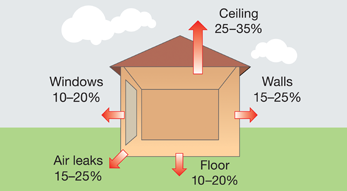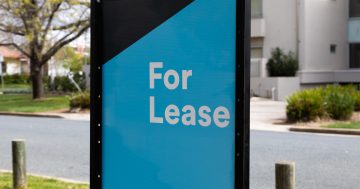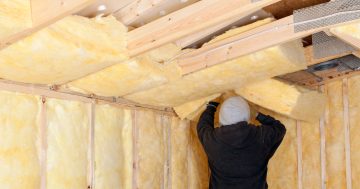
Canberra renters have been left in the cold because they are being forced to pay too much to heat draughty and uninsulated homes.
If you are a Canberra renter, your home is probably too cold and you are probably paying too much to try to heat it. This isn’t an inevitable part of being a renter – it’s predictable problem that the ACT Government knows about and isn’t yet doing anything about.
It comes down to the fact that rental properties are more likely than other dwellings to be draughty and uninsulated. Draughts mean that more cold air comes in, and if you use a heater, more of that hot air goes out. The lack of insulation means that cold air gets into your rental home in every direction – through the ceiling, through the walls, and through the floors. Typically in winter, 40-60% of heat loss happens just through air leakage and through the ceiling.

Typical heat loss in winter from an un-insulated home. Uninsulated homes use about twice as much energy for heating. (Image source.)
It’s expensive and it’s unhealthy
Why is this a problem? Firstly, it’s expensive. Renters in inefficient homes end up having to spend more just to get the same level of comfort. And we’re talking serious dollars – depending on the household, we could be talking a couple of thousand dollars a year. That sucks even if you can afford it. If you can’t afford it – and one in two low-income people are renters – then it might mean not being able to use heating at all, or not being able to afford school books for your children.
Secondly, it’s unhealthy. Over one in twenty deaths in Australia are attributable to cold – that’s more than in Sweden, and it’s over ten times more deaths than are caused by heat. The World Health Organisation advises that the lowest healthy temperature for a home is 18°C. Four in ten rental households include dependent children – and in these inefficient properties, the health of these children is at risk.
Just fix it? Renters can’t and landlords won’t
Imagine though that you’re a cashed up renter willing to spend money to install insulation. Your first problem is that you’re not allowed to. Your tenancy agreement doesn’t let you make lasting changes to the property – even if they are hands-down improvements. But even if your landlord agrees, you have another problem – your lease is probably up in less than 12 months and you don’t know if you’ll still be living there. Insulation or draught-sealing would improve your comfort straight away and pay themselves off within years, but if you aren’t going to be living there, that isn’t much use.
As for the landlords? They don’t pay the power bills. Funnily enough, in Canada, many landlords do pay the power bills. And, funnily enough, they improve the energy efficiency. In Australia though, landlords won’t see the energy savings that come about from insulation or draught-proofing.
Many landlords want to do the right thing. But there’s bad news for them too. If an inefficient gas heater breaks down, a landlord might think about replacing it with a more efficient split system air conditioner. This could reduce the appliance’s energy consumption by as much as 90%. But while repairs are tax-deductible, ‘improvements’ aren’t – so the ATO is sending a big signal to landlords not to do anything but the bare minimum.
This is where the ACT Government needs to step in
The situation described above is known as a ‘split incentive’: where one person pays the cost, and the other person gets the benefit. It’s a well-recognised problem, with a well-recognised solution: government intervention.
There are three basic things that the ACT Government could do to start improving matters.
Firstly, they could require that by a certain year all rental properties meet minimum energy efficiency standards. Just like properties should have a lockable door and working hot water, they should have to have basic improvements to make them more affordable to keep at a healthy and comfortable temperature. If you’re lucky enough to afford an investment property, then you have a responsibility to reduce the risk that the inhabitants face energy poverty.
Secondly, the ACT Government could push for a change to the current tax laws, discussed above, that discourage energy efficiency improvements. This sits with the Federal Government but, the ACT Government has an opportunity through the COAG Energy Council to get it on the agenda. And while you can say what you like about the current government’s views on energy, surely we can agree they’d be happy to give landlords another tax deduction.
Or the ACT Government might decide that these first two measures are a bit too hard and complicated. Fine then – just make it so that landlords have to replace gas heaters with efficient reverse cycle air conditioners. AC may be a problem for peak demand in summer, but in general, it’s way more efficient than gas combustion heating. Typically, the energy savings would pay off the initial outlay within just two years.
So what now?
So the good news is that the ACT Government has already said they’d look into this. The current Parliamentary Agreement between the ALP and the Greens commits to “Undertake a regulatory impact statement into setting minimum EER standards for rental properties by the end of 2017, with a view to implementing measures to improve energy efficiency of rental properties”.
The bad news is that there’s no visible sign that they’re doing anything. The last Parliamentary Agreement said they’d look into requiring energy efficiency ratings for rental properties – and sadly, nothing came of that.
Mick Gentleman is the Minister for Planning and the ball is in his court. It’s going to be up to us to make sure they don’t run away from this one.
Is it worth it?
What we have at the moment is a big problem, a simple solution, and massive potential benefits. No renter should be forced to choose between heating their home and feeding their family. Yet that is the situation we are in today. And while many of us hate receiving the power bill, homeowners at least have the opportunity to improve the energy efficiency of their properties. Meanwhile, renters are being left out in the cold.
Simply making it so that rental properties have to meet basic energy efficiency standards would mean renters could have healthy, comfy homes. For those on low-incomes the money they would save would mean being able to afford school uniforms for the kids, or to be able to pay the internet bill on time. It would mean better health for a huge portion of the ACT population. It would mean less pollution, and less strain on our electricity infrastructure.
Frankly, it’s outrageous that this has been allowed to go on for so long. It just takes a Government willing to do what’s right – to step in, address a market failure, and make sure that renters can also live in comfy homes.
If you agree, you can join the Comfy Homes campaign by signing our petition at http://petition.comfyhomes.org/, or visit http://comfyhomes.org/ and follow us on Facebook.
Joel Dignam is the Chair of Comfy Homes. He is currently enduring his fifth winter in Canberra as a renter.




















